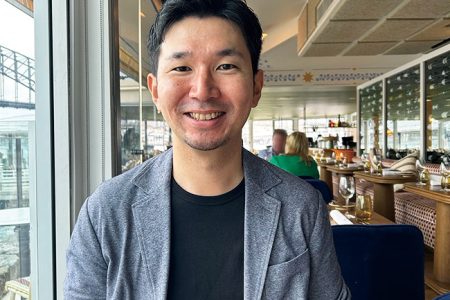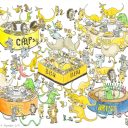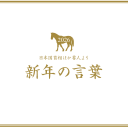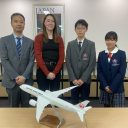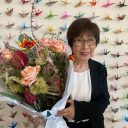Be the best king on the stage
you’re given
Founder of doq®
Yoshinori Sakuno
×
Ambassador of Japan to Australia
Shingo Yamagami
This special feature sees Yoshinori Sakuno—active in various business ventures as the founder of cross-cultural marketing company doq®, and currently the chairperson of Nichigo Press—in conversation with various important personalities to discuss all things business. In this edition, he sits down with the Ambassador of Japan to Australia (as of the end of 2020) who is currently spearheading various local media appearances and endeavours: Ambassador Shingo Yamagami.
(Editorial supervision: Kazuya Baba; Photography: Angela Elgiva)
*This is an English translation of an article featured in the July edition of Nichigo Press. Some of the comments refer to events that may have already concluded and were current as of April 2021.
PROFILE
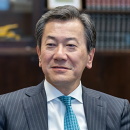
Shingo Yamagami
Upon graduating from the University of Tokyo, he joined the Ministry of Foreign Affairs of Japan in 1984. He also studied at the Graduate School of Columbia University. His overseas assignment includes Washington D.C., Hong Kong, Geneva and London. After being seconded to the National Police Agency and the Japan Institute of International Affairs, he assumed the role of Director – General of the Intelligence and Analysis Service and then Director-General of the Economic Affairs Bureau. In December 2020, he was dispatched to Canberra as Ambassador to Australia.
PROFILE
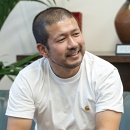
Yoshinori Sakuno
Yoshinori is the founder and group managing director of doq® and founded the company in 2009 after gaining experience in the APAC and US markets at the Tokyo branch and Chicago head office of American advertising company, Leo Burnett Worldwide. He received his MBA at the UNSW Australian Graduate School of Management, and master’s degree in Digital Media Management at Hyper Island Singapore. He was a finalist for three years running since 2016 for the Premier’s NSW Export Awards, won silver at the 2019 Sydney Design Awards, finalist for the Mumbrella Travel Marketing Awards, and finalist for the Ethnic Business Awards.

Yoshinori: I have very much been looking forward to today. Could you start off by talking about your background and experience?
Ambassador Yamagami: This year marks my 38th year in the Foreign Service. I have had posts in New York, Washington DC, Hong Kong, Geneva, London, and now Canberra. Most of my work has been associated with the US and China. Generally speaking, I’ve spent a long time in concluding treaties and conducting and trade negotiations. I’ve also been involved in work with national security and intelligence, so I’m often referred to as “the Department Store” by Australian counterparts because I’ve done a bit of everything (laughs). Many people often see out their full career in the Ministry of Foreign Affairs after joining the Foreign Service, but I’ve been temporarily seconded to other organizations 3 times. The first time, I was involved in the creation of UN peacekeeping operations bill at the Cabinet Secretariat, then I was the Director General of the Police Administration Department at the Ibaraki Prefectural Police. Finally, I had a role at Japan’s largest think tank—the Japan Institute of International Affairs. Looking back on it all, I learned the most as a government official during my time spent on those secondments I was fortunate to have being able to venture out of the cramped well and learn about the outside world.
Yoshinori: I’m sure many of the different fields you have worked in require a completely different sets of expertise. How do you approach your new posts?
Ambassador Yamagami: We live in an age where you must be both an all-rounder and a specialist. When I step in for trade negotiations, I study things like the other country’s situation and the position of the domestic industry in Japan. For work with intelligence, I delve into various fields such as the history and culture of the other country, and novels, and other literature. I study whenever I take on a new role, and there are always new discoveries to be made. I think this job is very fulfilling to those possessing a curious intellect.
Yoshinori: While you’re constantly learning new things and have left your mark everywhere you’ve been, how long do you need to become accustomed to a new post?
Ambassador Yamagami: In the world of government officials, a post generally lasts 2 years. It’s often said that you must study rigorously for the first 3 months after assuming your post, and then be fully capable in about half a year.
Yoshinori: To expect results in such a short amount of time is akin to what a tough investor expects in terms of results from founding a start-up.
Ambassador Yamagami: Government officials often receive comments and criticism about how easy it must be because our posts last for 2 years, or how we don’t develop any specialist skills because there’s no continuity. While it can be viewed in that manner, it also doesn’t change the fact that we come into roles knowing that we need to put in a great deal of effort to make a difference in those 2 years.
Yoshinori: Do you have any experiences that have left a particular impression on you?
Ambassador Yamagami: I was completely immersed in the life of police officers for 2 whole years when I was the Director General of the Ibaraki Prefectural Police. The memory of working up a sweat together with everyone in the regional police is still fresh in my mind, and I think it’s the most treasured asset in my career as a government official.
Yoshinori: Is it perhaps because the police organisation culture left an impression on you, or was it the significance of meeting such people?
Ambassador Yamagami: The police have it in their DNA to respond as an organisation; a monolith, if you will. That is the largest difference between them and the Ministry of Foreign Affairs. Another is their exposure to human tragedy. The police are an organisation that faces and works adjacent to crime scenes; places that capture the tragic and unfortunate side of society. That is why sometimes their response receives public support, whilst at other times they are criticised bitterly when things don’t go well. Learning these aspects was a great experience for me.
Yoshinori: Your experiences and background must have helped to shape your beliefs and approach to work as an ambassador. Is there anyone who you admire or inspires you?
Ambassador Yamagami: First and foremost, my motto in my work life is to “make a difference [in my own way]”. There are three main jobs as an ambassador. The first is to cultivate a network of connections. The second is to collect information through this network you have built. The third is to utilise the connections and spread the Japanese perspectives externally. Different people will have vastly different approaches to any of the aforementioned jobs. You can’t be spoiled and think that merely sitting in the Ambassador’s chair is a job well done. One person I admire is the Ambassador of Japan to Australia in the mid-1990s, Yukio Sato. Even now, when I ask Australians which Ambassador of Japan has left the biggest impression on them, a large bulk of them respond with “Yukio”. Former Ambassador Sato was a distinct individual and exuded a unique amiability and charm. He had excellent foreign communication skills. When my Canberra post was confirmed, he kindly gave me advice time and time again, and I inherited many valuable connections from him.
Yoshinori: There must be many business owners who are envious of the fact that someone of your position at the top of a government organisation has a mentor. Business owners, who are the heads of organisations, must make their own decisions and take risks. I feel as though there are many owners of Japanese companies in such positions who would appreciate having a mentor.
“The first 100 days”

Yoshinori: Your first 100 days have passed since you took up your post in Canberra. Please tell us about what you have done in Australia and any impressions you have gathered.
Ambassador Yamagami: I’ve met lots of people from various fields such as politics, government, economics, media, think tanks, and universities. In fact, within the field of economics and before my official posting, I made a concerted effort to meet with chairpersons and CEOs of major corporations doing business in Australia (7 major trading companies, 3 big banks, major manufacturers, etc.). What I felt upon meeting various people in Japan before my posting and in Australia during my first 100 days is that the Australia-Japan relationship is extremely close. Being able to experience the significance of role played by trade and investment connections firsthand was invaluable. I can also say that there are three unique characteristics of Canberra. The first is that it’s highly accessible, so as the Ambassador of Japan I can meet with most people if I make appointments with them. The second is that Australians are open. They will speak without reserve and tell you things directly. The third is that they listen to whatever Japanese have to say. This isn’t merely because the Australia-Japan relationship is so close. Australia is currently in a difficult situation in terms of its relationship with China, so they listen to the views of the Ambassador of Japan because Japan has the longest history with China as well as a plethora of experience. These three points are what have left the biggest impression on me in my first 100 days.
Yoshinori: Have you had any experiences where your expectations of Australia, before your posting, has been overturned?
Ambassador Yamagami: I honestly didn’t have very high hopes about the food, but I was pleasantly surprised to discover that the food in Australia is absolutely delicious. After spending time in the US and the UK, I can say out of sheer experience that the food here is tasty.
Yoshinori: I spent some time living in Chicago before coming to Sydney, and I think that a big difference between food in Australia compared to the US is that all food in the States, whether it be Japanese or Italian, is made to suit the American palate, whereas you can enjoy authentic international food in Australia. I believe that this is because in the US, you have fourth or fifth generation Americans living there, whereas Australia still has a relatively recent history of immigration and many residents are first or second generation Australians. That’s why I think the “authenticity” still remains.
Ambassador Yamagami: If I could add something to that, I’d say that, geographically speaking, Australia is far closer to Asia than New York or London. The ease of procuring ingredients and travel here from such countries might also be what facilitates the authentic flavours of these cuisines.
Yoshinori: It’s quite surprising to find that the fact that Australia has a highly developed food culture is not more well known outside of the country.
Ambassador Yamagami: I believe it’s my duty to increase the presence of Japan in Australia, whilst also helping to increase the presence of Australia in Japan, so I’d love to promote the deliciousness of food in Australia wherever I get the opportunity.
Paving the way for Prime Minister Suga ’s visit to Australia
Yoshinori: Please tell us about what aspects of the Australia-Japan relationship you would like to focus on from here on.
Ambassador Yamagami: I’m currently experiencing how tremendously fast the relationship between Australia and Japan is strengthening first-hand as I stand at the forefront of diplomacy, and I would like to continue to build on this relationship in various areas. Politically speaking, Prime Minister Morrison visited Japan in November last year despite the burden to undergo self-isolation for two weeks upon return. We are currently working hard to have Prime Minister Suga visit Australia this year in reciprocation. Before that, we would like to organise the next Japan-Australia 2+2 Foreign and Defence Ministerial Consultations ( from Japan: the Minister for Foreign Affairs, Toshimitsu Motegi, and Minister of Defense, Nobuo Kishi; from Australia: Minister for Foreign Affairs, Marise Payne, and Minister for Defence, Peter Dutton) soon. In terms of national security, I would like to see a prompt conclusion to the Japan-Australia Reciprocal Access Agreement (RAA) that was agreed upon in principle during Prime Minister Morrison’s visit to Japan. The legal framework for the Japan Self-Defense Forces to have joint training and military exercises in Australia, and the Australian Defence Force to do the same in Japan can be established once it is concluded. I think it is an extremely important contribution both countries can put through from the perspective of increasing deterrence in the Indo- Pacific region and maintaining peace and safety, so I’d like to work on that quickly. Now, economically speaking, Australia and Japan already have a close trade and investment relationship. Australia exports food, energy, and mineral resources to Japan, and Japan exports vehicles, and machinery to Australia. I want to transcend this existing complementary trade relationship and forge a new horizon. To that end, I’d like the government and embassy to provide further support and fortify an environment for Australia-Japan collaborations such as on the hydrogen production in Latrobe Valley, or the infrastructure development in Western Sydney. In terms of interpersonal communication, while movement has been curbed due to the current pandemic, I’d like to revitalise communication and exchange between politicians and youth. Finally, I’d like to say that the cooperation between Australia and Japan in terms of the Indo-Pacific and international stage is progressing in a close-knit manner. Before attention was paid to the Quad (the Quadrilateral Security Dialogue between Japan, Australia, the US, and India), Australia and Japan had been the driving force behind other initiatives such as the Asia-Pacific Economic Cooperation (APEC), and the Trans-Pacific Partnership (TPP). Reforms of the World Trade Organization (WTO) and cooperation within the Organisation for Economic Co-operation and Development (OECD), where Australia’s former Minister for Finance, Mathias Cormann is the Secretary-General, shows the versatility and depth of the Australia-Japan relationship.
Yoshinori: Australia has unique geographic quirks with Japan such as opposing seasons and a time difference of only an hour. I feel as though Japanese companies should actively take advantage of these quirks when considering investment and building relationships.
Ambassador Yamagami: The first thing I did when I found out that I’d be going to Australia was buy up all of the Australia-related books at a bookstore in front of Tokyo Station (laughs). I was shocked to find that there was a decent number of books on countries such as the US, China, Russia, the UK, Indonesia, and Thailand, but only three books related to Australia. Australia and Japan share such a close relationship, yet not being able to have information at my fingertips astounded and disappointed me. That’s why I’ve started “News from under the Southern Cross” because I’ve been made aware of this lack of information, so I want to share news of Australia with Japan. It’s a series of my modest utterings that are uploaded onto the Embassy’s official website. I want to increase the level of awareness about Australia in Japan by telling Japanese people all about what interests me or has caught my eye as someone who has been posted to Australia for the first time. The English translations are also released concurrently, so I can share with Australians what a Japanese diplomat does and experiences, and so continue to contribute to the strengthening of the Australia-Japan relationship.
Yoshinori: I also believe that there is no reason not to have more focus on Australia, especially considering how close the country is to Japan, how much they love Japan, as well as their continued growth despite being a developed country, and their stable state of affairs.
Ambassador Yamagami: According to a statistical survey conducted by the Japan National Tourism Organization (JNTO), Australians spend the most money out of all international tourists in Japan. I also think the ability of Australians to get their message across will also work in their favour. Australians are well-experienced in travelling all across the world and spreading the word about their travels. Most of the English remarks floating around about what places in Japan are good to travel in come from Australians. This information is what informs people from the US and UK. I think it’s necessary for this aspect to be further recognised in Japan.
Yoshinori: I think the social network of each Australian is extremely wide and has high potential to spread across borders, partially given approximately 1 in every 4 Australians is born overseas. Australians are said to be innovators in the world of travel, but I also think that they are travellers constantly paving the way towards new experiences and destinations.
Connecting Australia and Japan with Japanaroo 2021

Yoshinori: Preparations are currently underway in Sydney, under the direction of the Consulate General of Japan in Sydney, to promote Australia-Japan exchange through a new united public and private sector event known as “Japanaroo”. The event name is a portmanteau of “Japan” and “kangaroo”, and is a new venture where Japanese-related events, including those involving culture, food, business, and education, are held across Australia at the same time for 10 days from August 20.
Ambassador Yamagami: I think it’s a wonderful event. There’s a tendency for events to showcase Japan to fall into the mould of performing certain forms of classical theatre, martial arts, or introducing tourist spots, but I think it’s quite pertinent to showcase a life-sized version of Japan from all angles in this manner. I constantly feel the burning passion Australians have towards Japan, so we’ll offer our support to this event to meet those soaring expectations.
Yoshinori: I’d like for this event to take on the challenge to see just how much interest can be garnered from the average Australian by targeting even those who don’t have any interest in Japan.
Ambassador Yamagami: Japan was Australia’s largest trading partner in the 40 years between 1968 and 2008. When I visited Queensland and Western Australia, I was told with such earnestness that the people of those states would not be as prosperous as they are without cooperation with Japan, and that Japan mining resources, such as coal and iron ore, supported the Australian economy by providing a stable export destination. Those who do business with Japan understand firsthand just how important the relationship with Japan is, but I feel as though looking at Australia as a whole, people have started to take it for granted. This is why I’m hoping Japanaroo will provide a big opportunity to remind people about just how important [this relationship with] Japan is.
Yoshinori: From both a political and private level, I’d love to see [the event] as an opportunity for the Japanese presence to grow within the multiculturalism of Australia. Local Australians don’t really know what kind of presence the Japanese community has and what we’re doing, so I think one of the tasks will be to address how to make this visually tangible.
Ambassador Yamagami: I think the history of Japanese Americans provides a good example of how Japanese people assimilate into the places they live. Perhaps the fact that the Japanese community doesn’t stand out is a testament to just how much effort the people from Japan have put into trying to integrate into the Australian community.
“Be the best king on the stage you’re given”
Yoshinori: Readers of Nichigo Press come from all walks of life, such as 20-something-year-old young professionals, entrepreneurs and business people in their 30s and 40s, to those looking to change careers, and international students. Could you offer a message to these people?
Ambassador Yamagami: A very wise person of my senior who was a top official at the Ministry of Economy, Trade and Industry once told me to “be the best king on the stage you’re given.” These are words I still cherish to this day. The stage you’re given may be large, or it may be small. But as long as you strive to do your best in the situation you’ve been placed in, then a path will open up for you. There have been many times in my life as a government official where I’ve thought to myself, “Why am I doing this job? I should just quit.” Now that I look back on it all, I can say with confidence that it was precisely because I was given those posts that I learned so much. There are no detours or pointless tasks in life. None whatsoever. Doing your very best in the environment you have been given will be experience earned and become an asset to you. This will then lead to your next job. That’s what I want to tell young people.
Yoshinori: Do you personally have any long-term goals?
Ambassador Yamagami: Japan is a magnificent country, not only in terms of its economy and technological prowess, but political maturity, social stability, robust national defence, and qualities of individual nationals. Yet, more often than not, Japanese people are not great at oral presentations. Reading and listening skills may continue to grow in school education in Japan, but speaking skills aren’t being developed. Since I started my career at the Ministry of Foreign Affairs, I am determined, as a diplomat, to communicate with my own words in order to increase the presence of Japan in international society, and to commensurate with the features of Japan. I probably have a few more years until the end of my career in the Ministry of Foreign Affairs, but I want to continue to communicate with others while I still have the ability to spread the message in these last few years and beyond. By doing so, I believe Japan can continue to contribute to international society.
Yoshinori: Thank you very much for your time today.
(At the official residence of the Ambassador of Japan to Australia, 15 April 2021.)
“News from under the Southern Cross”
https://www.au.emb-japan.go.jp/itpr_en/bilateral_official_visits_en.html
Official website of the Embassy of Japan in Australia
https://www.au.emb-japan.go.jp/itprtop_en/index.html
Official Facebook page of the Embassy of Japan in Australia
https://www.facebook.com/JAPANinAUS/
Official Twitter account of Ambassador Yamagami
https://twitter.com/YamagamiShingo
Official Twitter account of the Embassy of Japan in Australia (Consul safety information)
https://twitter.com/JapanEmb_AUS
